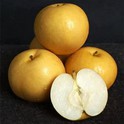As an organic pear supplier, I've often been asked whether organic pears are rich in fiber. It's a question that not only concerns health - conscious consumers but also those interested in the nutritional value of the produce they're purchasing. In this blog, I'll delve into the fiber content of organic pears, explore their health benefits, and share some information about the different varieties we offer.
The Fiber Content in Organic Pears
Fiber is an essential part of a healthy diet, and organic pears are a great source of it. On average, a medium - sized organic pear (about 178 grams) contains around 5.5 grams of dietary fiber. This amount accounts for approximately 22% of the recommended daily intake of fiber for an adult, which is set at 25 grams for women and 38 grams for men by the Institute of Medicine.
There are two types of fiber: soluble and insoluble. Organic pears contain both. Soluble fiber forms a gel - like substance in the digestive tract. It helps to lower cholesterol levels by binding to cholesterol in the gut and preventing its absorption into the bloodstream. This type of fiber also helps to regulate blood sugar levels by slowing down the digestion of carbohydrates.
Insoluble fiber, on the other hand, adds bulk to the stool and helps to prevent constipation. It passes through the digestive system largely intact, promoting regular bowel movements and keeping the digestive tract healthy. Organic pears' combination of soluble and insoluble fiber makes them an excellent choice for maintaining digestive health.
Health Benefits of Fiber in Organic Pears
Digestive Health
As mentioned earlier, the fiber in organic pears plays a crucial role in digestive health. Regular consumption of pears can help prevent constipation and promote a healthy gut microbiome. The insoluble fiber acts as a natural laxative, while the soluble fiber feeds the beneficial bacteria in the gut. These bacteria are essential for proper digestion, immune function, and even mental health.
Heart Health
The soluble fiber in organic pears helps to reduce cholesterol levels, which in turn lowers the risk of heart disease. High cholesterol is a major risk factor for heart attacks and strokes. By binding to cholesterol in the gut and removing it from the body, the soluble fiber in pears helps to keep the arteries clear and the heart healthy.
Weight Management
Fiber is known to promote feelings of fullness. When you eat an organic pear, the fiber expands in your stomach, making you feel satisfied with fewer calories. This can help you control your appetite and reduce overall calorie intake, which is beneficial for weight management.
Different Varieties of Organic Pears and Their Fiber Content
We offer several varieties of organic pears, each with its own unique flavor and fiber content.
Fresh Pear
The Fresh Pear is a popular choice among our customers. It has a sweet and juicy flavor, and it's also a good source of fiber. A medium - sized Fresh Pear contains about 5 grams of dietary fiber, providing a significant boost to your daily fiber intake.
Qiuyue Asian Pear
The Qiuyue Asian Pear is another variety we offer. It has a crisp texture and a refreshing taste. This pear is slightly smaller than the average pear, but it still packs a punch in terms of fiber. A medium - sized Qiuyue Asian Pear contains around 4 grams of fiber.


Wonhwang Pear
The Wonhwang Pear is a Korean variety that is known for its large size and sweet flavor. A medium - sized Wonhwang Pear can contain up to 6 grams of dietary fiber, making it one of the highest - fiber pears in our collection.
Incorporating Organic Pears into Your Diet
There are many ways to incorporate organic pears into your diet. You can eat them fresh as a snack, which is the simplest and most straightforward way to enjoy their fiber - rich goodness. You can also add them to salads for a sweet and crunchy element. Sliced pears go well with greens, nuts, and cheese.
Pears can also be used in baking. You can make pear pies, tarts, or muffins. When baking with pears, you can retain most of their fiber content, especially if you leave the skin on. Additionally, you can make pear smoothies by blending pears with yogurt, milk, and your favorite fruits.
Conclusion
In conclusion, organic pears are indeed rich in fiber. They offer a wide range of health benefits, from promoting digestive health to reducing the risk of heart disease and aiding in weight management. Our organic pear varieties, such as the Fresh Pear, Qiuyue Asian Pear, and Wonhwang Pear, provide different flavors and fiber contents to suit various tastes and nutritional needs.
If you're interested in purchasing our high - quality organic pears for your business or personal use, we'd love to hear from you. Reach out to us to start a conversation about procurement and discover how our organic pears can add value to your offerings.
References
- Institute of Medicine. (2005). Dietary Reference Intakes for Energy, Carbohydrate, Fiber, Fat, Fatty Acids, Cholesterol, Protein, and Amino Acids. National Academies Press.
- Harvard T.H. Chan School of Public Health. (2023). The Nutrition Source - Fiber.
- Mayo Clinic. (2023). Health Benefits of Fiber.





